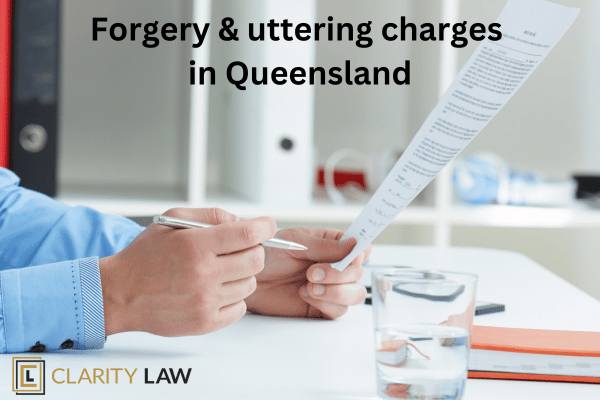
In the complex landscape of criminal law, the charges of forgery and uttering stand out for their nuanced legal definitions and significant implications for the accused. Under section 488 of the Criminal Code in Queensland, these charges are treated with utmost seriousness, reflecting the potential harm to individuals and the broader societal trust in the integrity of documents and records. This blog aims to demystify the legal intricacies of forgery and uttering.
What Constitutes Forgery?
At its core, forgery involves the creation, alteration, or manipulation of a document with the intent to deceive or defraud. The legal definition encapsulates a range of actions that result in a document falsely purporting to be something it is not, whether by presenting itself as authorised by a non-consenting individual or as originating from a non-existent entity. The term "document" is broadly defined to include any written, coded, or symbolically marked medium capable of conveying meaning, thereby encompassing both tangible and digital records.
Legal Elements of Forgery
To secure a conviction for forgery, the prosecution must demonstrate two critical elements beyond a reasonable doubt:
- The Act of Forgery: The accused must have engaged in making, altering, or dealing with a document in a manner that misrepresents its authenticity, origin, or authority. This encompasses actions that suggest a document was authorised by someone who did not give such authority, or that alter a document’s appearance or content to misrepresent its true nature.
- Intent to Defraud: The essence of forgery lies in the intent to practise fraud upon another, which is established if the forgery could potentially prejudice any individual's rights or compel them to act against their duty or interest. Crucially, the intent to defraud does not necessitate an aim to cause financial loss, broadening the scope of actions considered fraudulent.
The Charge of Uttering
Uttering, closely related to forgery, involves knowingly passing off a forged document as genuine, with the intention of deceiving someone into accepting it as legitimate. Like forgery, the offence of uttering hinges on the intent to defraud, underscoring the perpetrator’s aim to leverage the forged document to deceive and potentially harm others.
In essence Forgery is the creation of a false document while uttering is the act of using that forged documents to defraud another person.
Defences
The main defences for forgery or uttering would likely be;
- The defendant did not, or at least the prosecutor cannot prove that the defendant forged a document
- That the document was not in fact forged
- That if the document was forged the document was not uttered
- If the document was forged and was uttered that the defendant did not do it with an intention to defraud.
Penalty
The maximum penalty for forgery and uttering is 3 years in prison. If however the document was a power of attorney or document issued by a lawful authority the maximum penalty increases to 7 years.
If the forgery involved a security, insurance policy, will or birth certificate the maximum penalty increases to 14 years.
Which Court hears the Forgery Charge?
The Magistrates courts hears the charge.
Relevant Cases
In the case of R v Perrin [2017] QCA 194, the appellant, Mr. Perrin, appealed against his conviction on the grounds that the trial judge failed to leave an exculpatory provision for the jury’s consideration. The provision stated that a person is not criminally responsible if they act in the exercise of an honest claim of right.
The appeal was dismissed as proof of the offences precluded the application of the provision. The charges stemmed from transactions with the Commonwealth Bank of Australia involving forged signatures. The appellant argued that he had authority to sign the documents on behalf of his wife. However, the court held that proof of dishonesty in the offences negated the possibility of an honest claim of right defence. Additionally, the jury directions were deemed adequate. Both grounds of appeal were dismissed.
Conclusion
In Queensland, forgery and uttering are serious charges with significant legal implications. Forgery involves creating or altering a document with the intent to deceive, while uttering is knowingly passing off a forged document as genuine. To secure a conviction, the prosecution must prove the act of forgery and the intent to defraud beyond a reasonable doubt.
Defences may include disputing the act of forgery or uttering, or challenging the intent to defraud. Penalties for forgery and uttering vary based on the type of document involved, with maximum sentences ranging from 3 to 14 years. These charges are heard in the Magistrates Court.
For those facing allegations of forgery or uttering, it is crucial to consult with legal professionals who can provide expert advice and representation, ensuring that the accused's rights are fully protected and upheld within the legal system.





